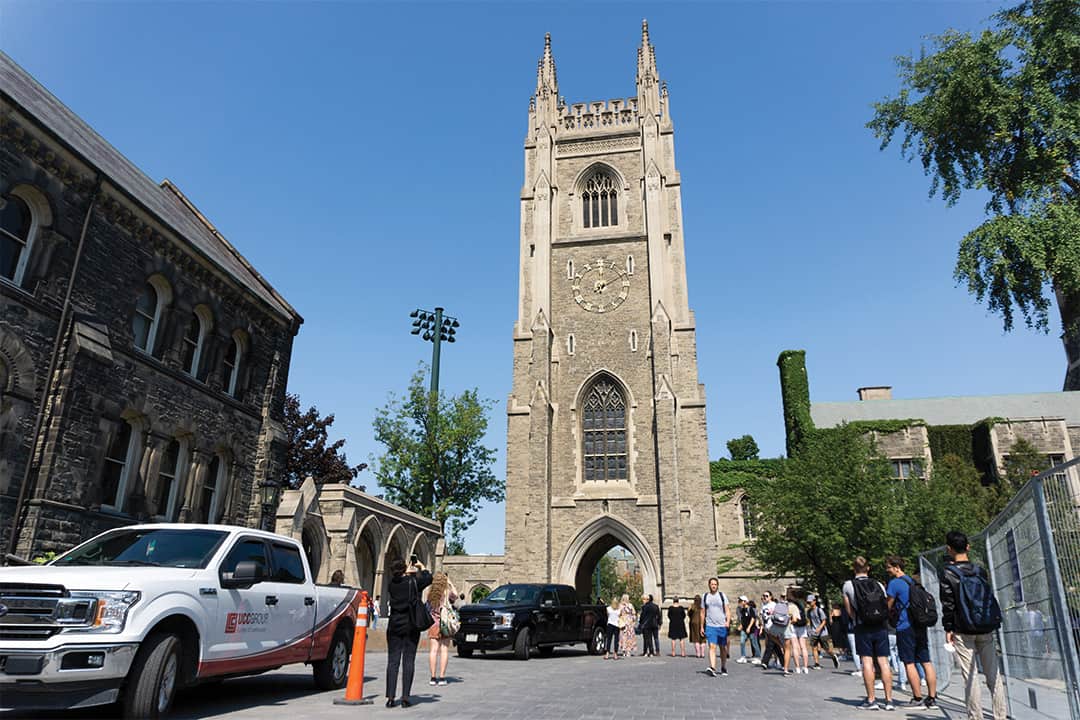On September 8, all three U of T campuses lowered flags to half-mast to mourn Britain’s Queen Elizabeth II, who passed away earlier that day. The next day, the carillon bells at Soldier’s Tower tolled 96 times at noon — once for each year of the late Queen’s life. A large crowd of community members, some dressed in black, gathered to observe the tribute.
“The University of Toronto community joins all Canadians in mourning the loss of our Sovereign, Her Majesty Queen Elizabeth II,” wrote U of T President Meric Gertler in a September 8 statement.
U of T’s flags will remain lowered to half-mast until the Queen’s state funeral on Monday, September 19.
According to an announcement from Prime Minister Justin Trudeau, Canada will observe a national day of mourning for its late head of state. Canada is one of 15 countries that has the British monarch as its head of state.
Regarding the impact of Trudeau’s announcement on U of T and other campus operations, a U of T spokesperson wrote, “We will wait to hear further details about what a national day of mourning will entail for Canadians.”
Gertler added, “The U of T community benefits greatly from the contributions of the many students, faculty, librarians, staff and alumni who come from or reside in our fellow Commonwealth countries.” Of the world’s 195 countries, 56 remain a part of the Commonwealth today, including Canada.
According to U of T’s Facts & Figures for 2021, four commonwealth countries — India, Pakistan, Nigeria, and Bangladesh — are among the top 15 countries of origin for international undergraduate and graduate students. In 2020–2021, international student fees accounted for around 40 per cent of U of T’s total revenue.
Gertler further wrote in his September 8 statement, “Before she acceded to the Throne, in an address to the young people of her future realms and territories, she promised that her whole life would be devoted to the service of her people. She fulfilled that promise with unparalleled grace and dignity, and in so doing set a magnificent example for us all.”
Queen Elizabeth II ascended to the British throne in 1952, which made her the longest-serving monarch in British history. While many are grieving her death, others are drawing attention to the complicated colonial legacy she left behind.
In response to Gertler’s statement praising Queen Elizabeth II, Girish Daswani, an associate professor of anthropology at UTSC, tweeted, “I do not condone the offensive and objectionable message posted by UofT’s President.” Daswani explained that, while free expression is valuable in higher education, the statement “[does] not represent the values of millions of colonized peoples nor the standards of discourse we seek to foster.”
Daswani had attempted to mirror his tweet to a statement by Carnegie Mellon University, which condemned Uju Anya — a professor in Carnegie Mellon’s Department of Modern Languages — for a viral tweet wishing “excruciating” pain on the Queen. As Anya later explained, the Queen “supervised a government that sponsored the [Nigerian] genocide that massacred and displaced half [her] family.” In an email, Daswani told The Varsity that while he had adapted Carnegie Mellon’s words, “I made them mine and they certainly ring true for me.”
The late Queen visited U of T several times throughout her reign. She most recently interacted with U of T students at the 2002 Festival of Ontario at the Canadian National Exhibition, where she stopped by the U of T Blue Sky Solar Racing Team’s display. She also maintained close ties with Vincent Massey, founder of Massey College and U of T chancellor from 1947–1953.
With files from Angad Deol.


